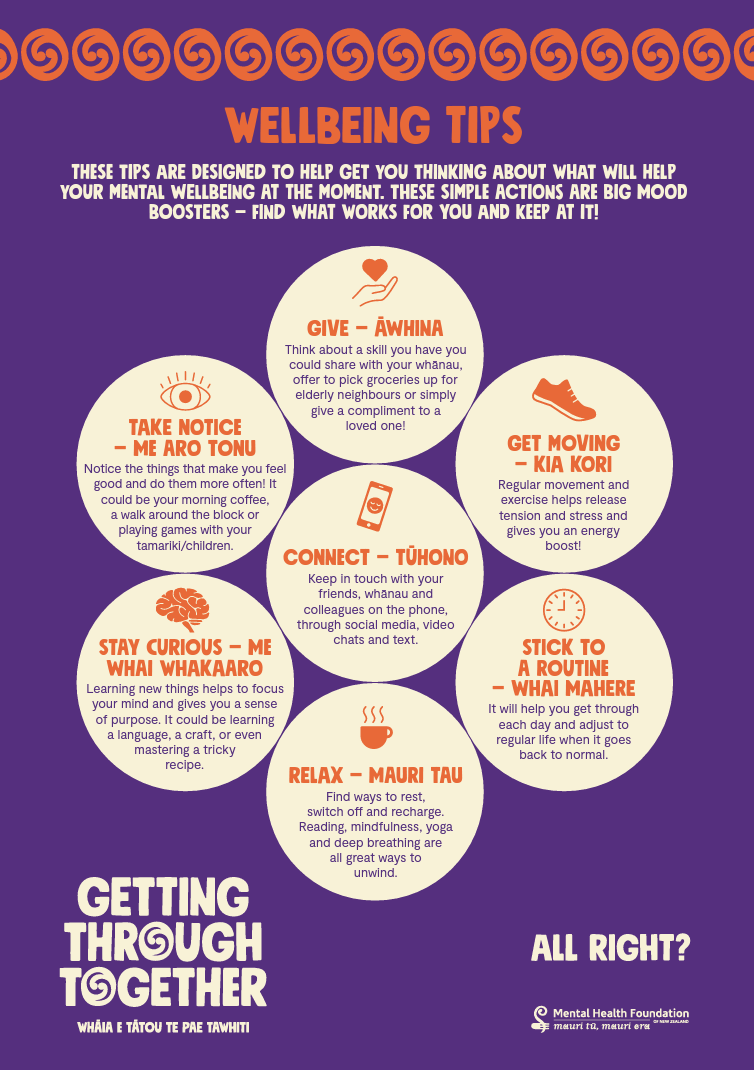Health In Te Whāriki
Protecting and nurturing health and wellbeing includes paying attention to aspects of physical care, such as healthy eating and nutrition and opportunities for physical activity.
Te Whāriki | Ministry of Education, 2017; p28
Maintaining health and wellbeing is a challenge that every single person in the world faces. They may face it differently and have their own individual challenges, but it is something that we can all relate to in one way or another.
We all approach our own health and wellbeing in our own way, but sometimes we tend to put ourselves last, especially those who work in a service industry like ECE where you are putting the needs of others first. This can also be true in our personal lives where we put the needs of our own children or family first and ourselves last.
In this part of the course, we will be looking at what health and wellbeing mean from a holistic standpoint alongside strategies that we can put in place to manage our own health and wellbeing.
| HEALTH | Typical definition of health - the state of being free from illness or injury; a person’s physical conditions |
|---|
We know that, for our purposes, true health is so much more. We need to include our mental, social, and spiritual health, along with our physical wellbeing to ensure that we are looking after ourselves holistically.
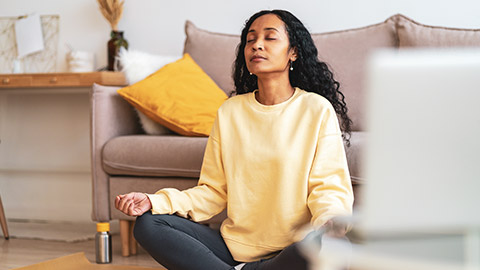
Activity – My perception of health
Take a moment and reflect on what being healthy means to you and then complete the following unfinished sentences.
- Good health to me means ...
- The signs of being healthy are ...
- To lead a healthy lifestyle, I need to ...
- The things that I do that are good for my health are ...
- When I am healthy, I feel ...
- The unhealthy things I do include ...
Now look at your list, or think about your answers. Are you looking at yourself holistically? Are you considering your spiritual self, your relationships, your financial choices, and your connection to your environment in the answers?
Types of Self-Care
Each area of self-care needs to be nurtured and protected for a person to be healthy in a holistic sense.
Physical Self-Care
You need to take care of your body if you want it to run efficiently. Keep in mind that there's a strong connection between your body and your mind. When you’re caring for your body, you'll think and feel better too.
Physical self-care includes what you are putting into your body as fuel for energy, how much sleep you're getting, and how much physical activity you are doing. It also means prioritising your body's needs by attending health check-ups, cancer prevention screens such as cervical smears and mammograms, and taking medication as prescribed.
Take a moment to consider what you currently do to contribute to your physical self-care. What would you like to do more of?
Social Self-Care
Socialisation is key to self-care. But, often, it's hard to make time for friends, and it's easy to neglect your relationships when life gets busy. Close connections are important to your wellbeing. The best way to cultivate and maintain close relationships is to put time and energy into building your relationships with others.
There isn't a certain number of hours you should devote to your friends or work on your relationships. Everyone has slightly different social needs. The key is to figure out what your social needs are and to build enough time in your schedule to create an optimal social life.
Take a moment and consider how you feel after spending quality time with great friends.

Mental Self-Care
Mental or emotional health refers to our state of emotional wellbeing. People who have good mental health generally possess a positive outlook and a sense of purpose and control over their lives. This enables them to realise their own abilities, cope with the everyday stresses of life, work productively, and contribute effectively to the community.
Factors that contribute to our mental health and the resilience needed to cope when faced with sad or difficult times include:
- our self‐concept (the way we see ourselves), self‐confidence and self‐esteem (the way we feel about ourselves)
- our sense of connection or belonging to different significant groups such as family, peers, or school
- our ability to appropriately express emotions such as love, anger, and frustration
- our ability to think creatively and be flexible when making decisions and resolving problems
- our capacity to function productively within society without exhibiting personally and socially disruptive behaviour.
Activity – Mental Self-Care
- Read through all of the Mental Health Tips on the Mental Health Foundation of NZ's website. These were curated to support people in lockdown during Covid-19, but the ideas are still useful today.
- Read the article: Me Time.
- Create a poster, for yourself, that shows at least five things you will do to help stay mentally healthy.
- Upload your poster to a journal post and share it with your peers. Review and comment respectfully on the work of others. Remember that these are personal, so only positive comments are appropriate.
We've provided this poster from the Mental Health Foundation, NZ as an example. You can click the poster to download it.
Spiritual Self-Care
Research shows that a lifestyle including religion or spirituality is generally a healthier lifestyle.
Nurturing your spirit, however, doesn't have to involve religion. It can involve anything that helps you develop a deeper sense of meaning, understanding, or connection with the universe. Many people who would say they don't believe in (a) higher power(s), still enjoy meditation for the sense of wellbeing it provides - a sort of spiritual connection to one's own mind.
Whether you enjoy meditation, attending a religious service, or praying, spiritual self-care is important.
Activity – Spiritual self-care with meditation
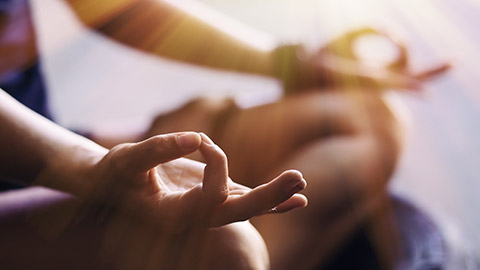
Meditation is a great way to achieve a sense of peace. It requires you to put your device down, shut out the noise, and sit and be present in the moment.
Thich Nhat Hanh, spiritual leader, poet, and peace activistMeditation can help us embrace our worries, our fear, our anger; and that is very healing. We let our own natural capacity of healing do the work.
To be mindful is to be singularly connected with what you are thinking about and what your body is doing. So yes, as long as you are thinking about that dish you are washing, then doing the washing up after dinner can be meditative. To do this, describe what you are doing with your body in your mind. For example, "I am using the sponge to remove food residue" and "I am running the water over the plate."
Picking an activity that also brings inner peace, such as just relaxing and sitting quietly, will bring broader benefits of course. The main point is that meditation means different things to different people.
Consider starting a ten-minute meditation practice today. The video below changes every single day to bring you a new guided meditation. Bookmark the link so you can enjoy the benefits long after you have completed this course.
Living a life with meaning and purpose is key to improving your psychological wellbeing. Your purpose doesn’t necessarily have to involve changing the world or finding a career devoted to helping others though.
Instead, you might make it your purpose to be kind every day, or make the world better by encouraging others to take care of the environment or adopt pets from the shelter. Maybe your purpose is to be an advocate for those who are hurting, like bullied students, the homeless, or victims of abuse.
If you feel like your life lacks purpose, don’t worry — there are many ways you can find purpose in life and build a life that has more meaning. Begin by thinking about the legacy you would like to leave behind.
Take a moment to consider what you would like to be remembered for. What impact would you like to have on the world?
Ways you can increase your sense of positivity
Recall positive life events
Spend time thinking about some of the best memories of your life. Whether it's a family vacation you went on ten years ago or an award you won at work two years ago, recalling the happiest times in your life can bring more positivity to your current mindset.
Recognising the good things that have happened to you over time — the people you have built memories with or the good times that you have experienced — is an important part of improving your wellbeing. Memories serve as reminders of the fullness life has to offer, especially when life feels like it isn't currently fulfilling.
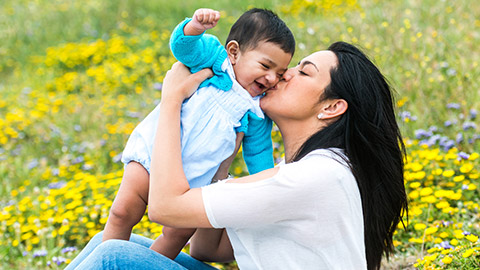
Take a moment and remember — in as much detail as you can — a purely positive memory. Think about the feelings, smells, and colours — breathe it all in. Do you feel a sense of joy?
Perform Acts of Kindness
Doing nice things for other people reminds you that you have the power to make a difference in the world. Giving to others also helps you think more positively and feel happier. Helping a neighbour in need, volunteering for a community activity, or raising money for a charity are just a few simple ways to improve your psychological wellbeing. Also, look for ways to be kind to others in your everyday life. Doing so benefits you in a number of ways. In fact, researchers indicate that individual acts of kindness release both endorphins and oxytocin — the feel-good hormones — and is one of the few things that creates new neural connections.
Consequently, kindness can become a self-reinforcing habit that takes less and less effort to perform. There's also some evidence linking kindness and healing. Look for ways to be kind to others and your body and mind will thank you.
The MayoClinic even has this to say about the health benefits of kindness:
Kindness has been shown to increase self-esteem, empathy and compassion, and improve mood. It can decrease blood pressure and cortisol, a stress hormone, which directly impacts stress levels. People who give of themselves in a balanced way also tend to be healthier and live longer.
Can you think of ways that you can incorporate more kindness in your life? Consider finding small acts to do for others when you are driving, shopping, waiting, walking, etc.
Take a moment and think about a time when you did something entirely selfless and expected nothing in return. How did it make you feel to give of yourself?
Practice Mindfulness
In the previous section, we provided information about meditation and the positive effects it has on your spiritual and physical health. A daily practice to spend 10-30 minutes being mindful is a great way to gain these benefits. Remember that being mindful doesn't require anything other than time and attention to what you are doing, but can also be as structured as guided meditation.
Express Gratitude
Gratitude turns what we have into enough.
Whether you send messages to people telling them how much you appreciate them, or you write about the things you feel thankful for in a journal, expressing your gratitude will keep you focused on all the good things in life. You can even express gratitude on social media.
Being grateful in everything you do will become a way of life. You'll discover you can be thankful for little things, like the beauty of the sunset and the big things like a new job, a new baby, a qualification earned, or a visit from an old friend. Finding things to be thankful for daily is a simple but effective way to boost your psychological wellbeing.
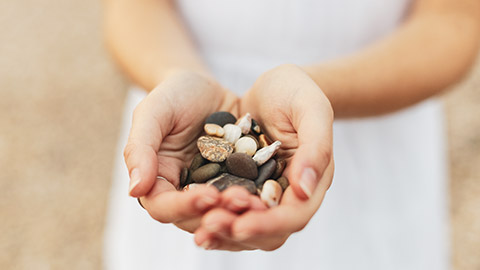
Activity – Gratitude rocks
- Gather a handful of pebbles, or any small objects. You'll need at least 10 but more is better.
- Put them in a pile or hold them in one hand.
- Move them individually from one pile to a new pile or the other hand.
- For each one you move, say something out loud for which you are grateful - one rock per gratitude.
- Do this until all of the rocks have moved piles/hands.
- Think about how the exercise made you feel. Can you see doing this every day?
YOUR Personal Health and Wellbeing
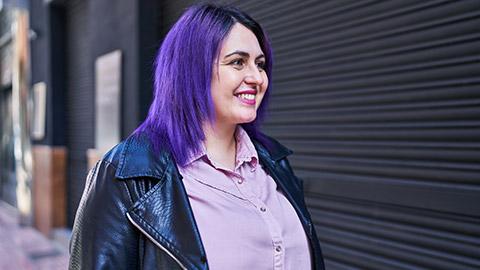
Activity — Assessing your own health and wellbeing
1. Start by thinking about your physical, mental, social, and spiritual wellbeing:
- What do you think you are doing well?
- What are your triggers, what stresses you out or makes you feel low?
- What would you like to improve?
2. Set goals to make improvements
- Use this template to record one goal from each type of wellbeing (physical, mental, social, and spiritual) that you will set for yourself to work on over the next month.
- For each goal, write a minimum of three strategies that you will use to achieve your goal.
- Share your goals with a friend or family member. (Enlist their help to stay accountable to the goals that you have set.)
- Upload your goals to a journal post. You can decide to publish it for your tutor only or for your peers to review and comment on.
Reach out, and ask for help when you need it.
Hopefully, you are feeling on top of your game as you are balancing your life and studies. Enrolling in this course is future-minded, and we hope is a source of positivity for you!
But when you aren't feeling mentally confident, everything feels harder. Asking for help isn't easy, but most of us have people in our lives that we can reach out to — no matter how big or small the problem is. If you feel that you don't have anyone, it may be that you don't recognise that the people around you are happy to help if given the chance. If you really are isolated, try and make connections with your colleagues in your ECE service or centre, or even peers in this course.
As kaiako, it may be you that someone is reaching out to, especially as an ECE student who is working on building relationships and connections. You may wish to pass along the following resources.
Community support
There are people you can talk to right now.
Talk to a trained counsellor about how you are feeling or ask any questions, call 0800 111 757 or free text 4202.
Depression.org.nz
To talk to someone for free about managing anxiety and stress at any time of night or day, call 0800 ANXIETY (0800 269 4389). They provide support, advice, and information 24/7.
Healthpoint | Anxiety Helpline
For a fully confidential, free, professional service with trained addiction counsellors, call 0800 787 797.
Alcohol and Drug Helpline
TAUTOKO is operated by trained and experienced social service practitioners who have undergone suicide prevention training. Talk to someone at 0508 828 865 (0508 TAUTOKO).
Lifeline | Suicide Crisis
If either you, or someone you know, is in immediate danger, please call emergency services immediately on 111.
NZ Police | Calling emergency 111

